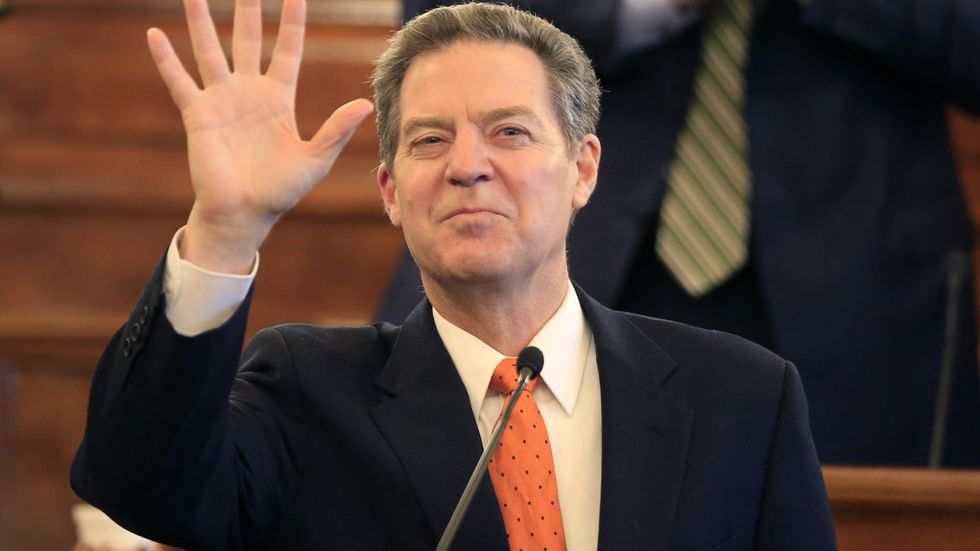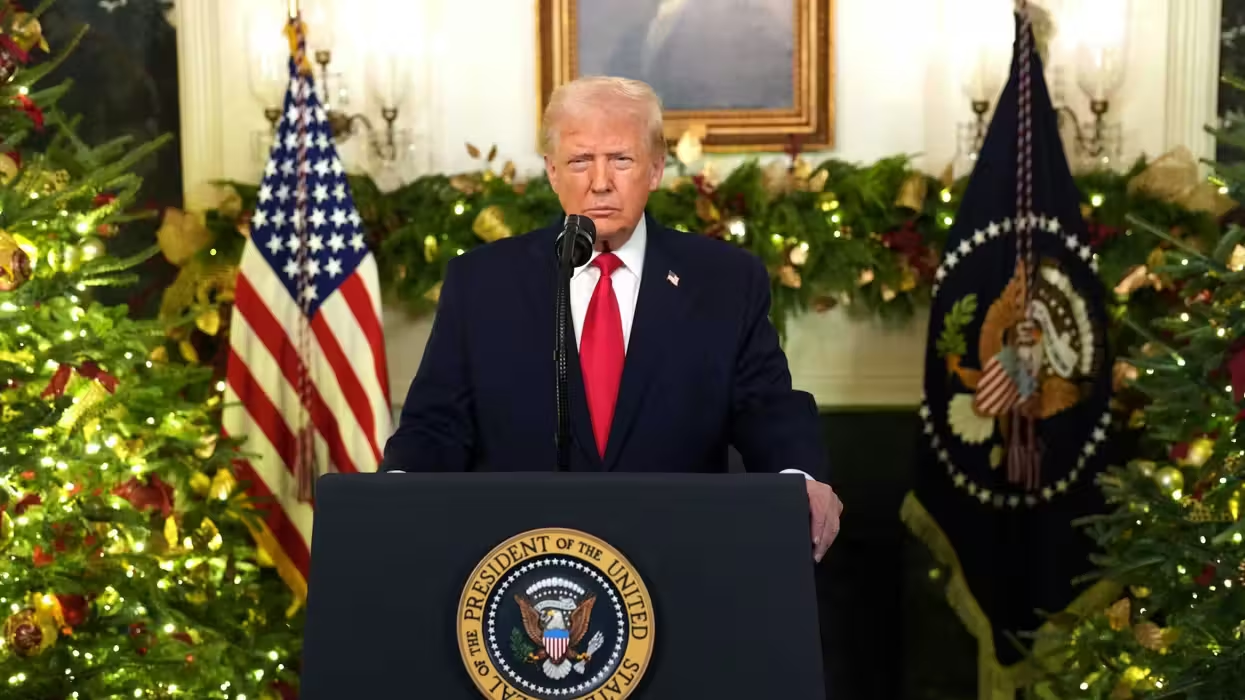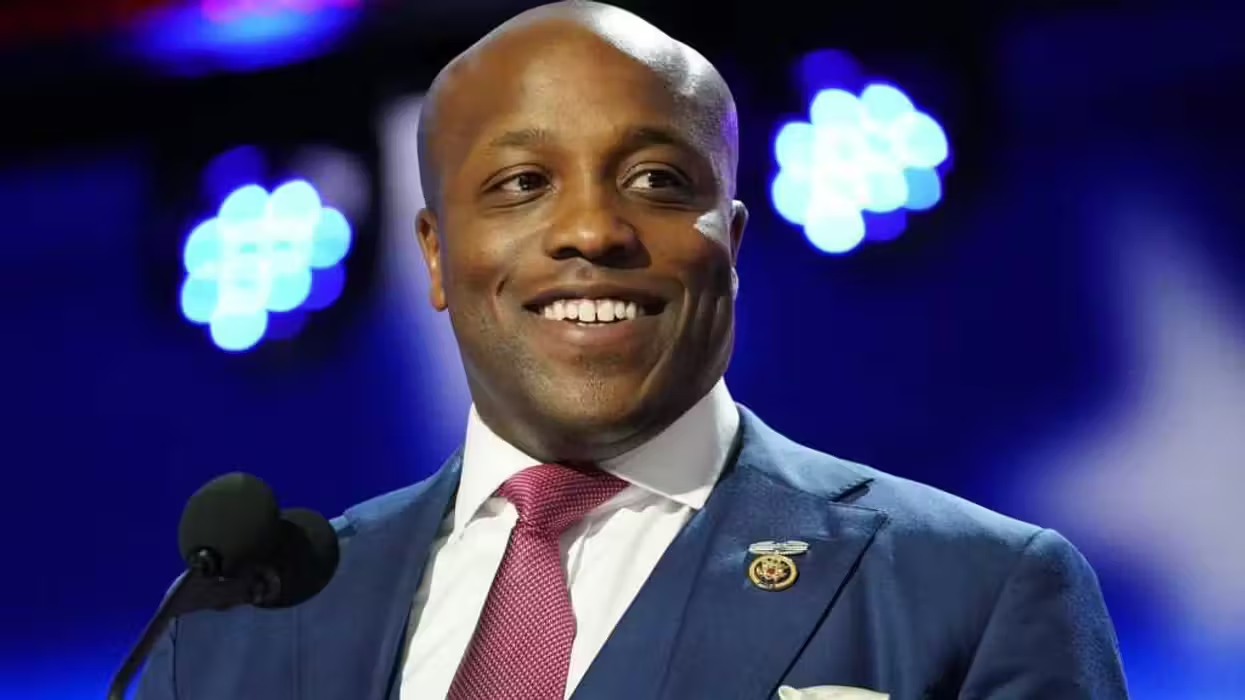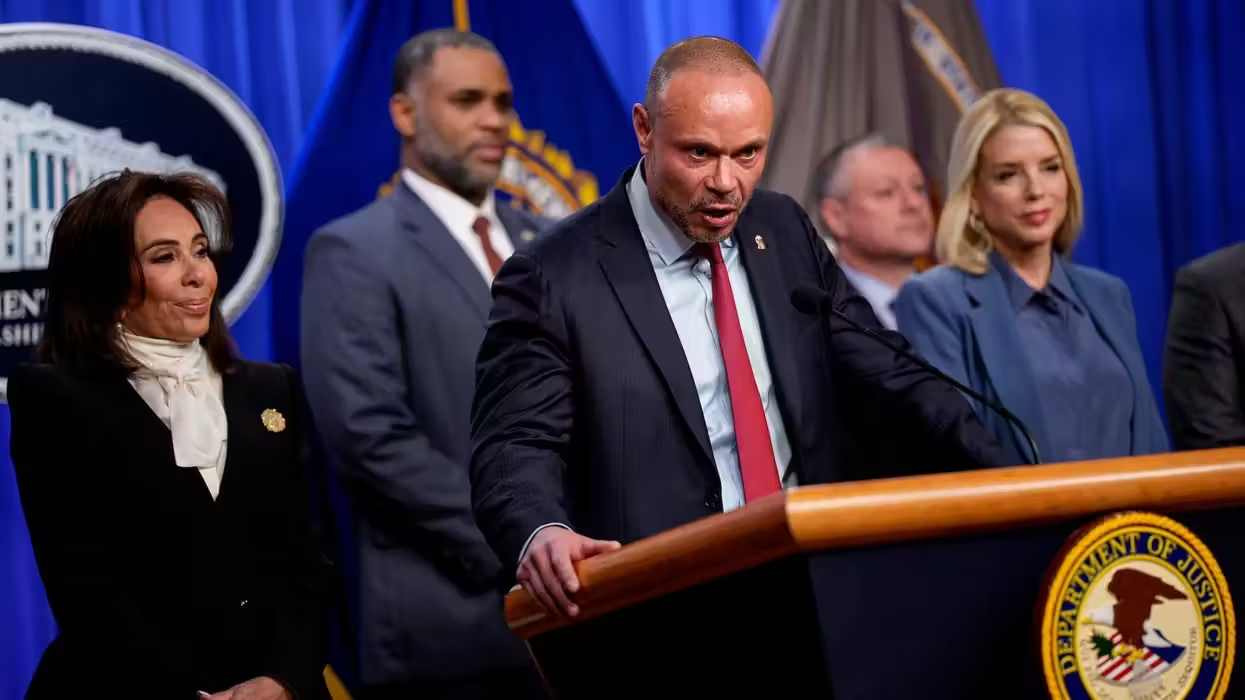
© 2025 Blaze Media LLC. All rights reserved.
Editor's note: This article is part two of an interview with Kansas Governor Sam Brownback (R). Read part one: Liberals are crying foul at Trump's tax plans. But this governor proves tax cuts work.
As the members of President Trump’s Cabinet continue to be confirmed, slowly but surely, Congress will soon turn focus to implementing the president’s economic agenda.
On the docket is major tax reform and regulatory reform. Speaker of the House Paul Ryan, R-Wisc. (F, 52%) has indicated that tax reform will be accomplished later this spring.
Last week, Kansas Governor Sam Brownback talked to Conservative Review about tax reforms undertaken in his state. Kansas lowered income taxes and reduced taxes on small businesses to zero, with the goal of encouraging new business formations and job creation. Those reforms worked.
In this part of the interview, the governor discusses the kind of policies the Trump administration should pursue at the national level.
The national outlook
Governor Brownback served in the U.S. Senate from 1996-2011. During the George W. Bush administration, Brownback saw the passage of national tax cuts.
CR: Senator Angus King would argue that the Bush tax cuts didn't do anything to affect growth. Can you speak to the philosophy behind that legislation and the effects of those tax cuts?
Brownback: I think he's dead wrong. I think there is a valid point in saying that all tax cuts are not created equal. There would be some tax cuts that you'd look at aren't going to produce the economic growth that other tax cuts are. They tried to, back then, reduce the marriage penalty tax. It's a social statement; that's not going to produce growth by and large — it'll be helpful some. What'll produce growth is if you cut the capital gains tax, and there you have studies and data that says that will produce growth.
The tax cut I'm most interested in now, two of them, for the national picture … one is cutting that tax on repatriating foreign dollars. Because that will just undoubtedly produce more revenue for the federal government near term and be a strong, positive impact on the economy because we've done it once before and it worked. The other one is cutting the small business tax — the Sub S corporate tax — in half. That's a targeted tax cut right on your key job-creating machine, which is small business. Small business is your primary job creator in America and it certainly is in Kansas. Our data shows that they responded well to the tax cuts when we took the tax off of small business. What we did is we went to zero on taxes on LLC, Sub S, and we left the tax rate alone on C corps.
Indeed, President Donald Trump wants to slash the tax on repatriated funds from the current 35 percent rate to just 10 percent. He has also pledged to massively cut taxes on businesses and individuals. There is a huge prospect for growth from this plan. But there is a danger of big budget deficits as well.
CR: I understand that in the state of Kansas there's a balanced budget requirement that's law.
Brownback: That's correct.
CR: When you're looking at a national picture, and you're attempting to be fiscally responsible and to encourage economic growth, what is the balance for that? How do you exercise prudence, because tax cuts in and of themselves probably will not do enough to balance the budget. Would you agree to that?
Brownback: On a near-term basis?
CR: Yes, yes sir.
Brownback: Well my goodness, you're so far from having a balanced budget in D.C. you can't hardly see it from where we sit. That budget, what is it? $400 billion off balance this year?
The fiscal year 2017 budget estimated for $3.21 trillion in tax revenues and $3.65 trillion in spending, a budget deficit of $443 billion. For perspective, that is approximately 2.6 percent of the 2017 GDP, the total dollar value of all goods and services produced in the entire country.
CR: Approximately that, yeah.
Brownback: Yeah, I mean you can't [see a balanced budget], without major entitlement reform. I haven't look at it in depth like I used to, but we used to consider a $400 billion deficit an enormous budget deficit. I was in a Congress that balanced the budget for a couple of years. You've got to get growth. The key piece — and it's the key piece for Kansas, too — is growth of the economy. You had this lethargic Obama economy that can't get past 2 percent [growth], and you really need to be hitting three-and-a-half, and we can do four. But you can't if you overregulate the place or you put too much tax burden on.
The other thing we were doing and seeing in Kansas so much, is we were just seeing a lot of our successful businesses move to Texas. It had zero income taxes and we were constantly losing a lot of our business people to move to Texas, because when I started, our income taxes were at 6.45 percent. It's at 4.6 now and zero on small business, your major job creators. Now, we still lose people to Texas because of the growth, but our trend lines have been slowing down and we're getting people moving in from Missouri and we're getting wealth and businesses moving in from Missouri. We've shifted our trend lines.
We got a ways to go, but we've made some really positive moves, and the key, national and for us, is going to be getting that economic growth taking place. The problem for us has been with low commodity prices. It’s just … you're subject to global forces that you have no power over.
CR: That's true, a lot of people do think that government just has this magical power to influence prices like that, the stock market. President Trump is getting a lot of credit for the record-high stock market this week. Conservative review published a piece about that saying, "Don't give him all the credit." If you give Trump credit for record-high stock prices, you have to acknowledge the stock prices under President Obama were pretty high, too.
Brownback: Yep. There's so much of this that's emotional and psychological. But something that's hurt us is that the Left has beat on us so much … they try to beat the place down, and that hurts you because it's just such a philosophical debate on taxes that are going on here. That, when people are constantly beating on you negative about it, because they don't want to see the tax policy succeed. Those have impact — just the psychological piece of it.
This is working. We've got data of a recent study released in the last month about it, and this is the first study that's really gone out and looked at it in depth and a fair comparison. State economies are a little hard to gauge, just because there's so many economic forces that swirl around and location's significant. The one thing we can control is our tax rates and our tax policy.
It’s not just taxes
There are other policies besides taxes, of course, that the government does have control over.
CR: Now, tax policy is not the only component of what makes an economy thrive or what doesn't. There are other policies — for example, regulations — that are inhibiting job growth in the entire country. When you take a look at what policies the Trump administration can pursue, what else are they going to have to take a look at if they want to see that type of economic growth that you're talking about?
Brownback: I absolutely think you have to go at the regulatory state. This thing is really stifling, particularly small business, to the point of just strangling them. This is something Republicans have been a lot better about talking about then getting done; it's hard to do. When I came in, I appointed an Office of the Repealer, and this person was to look for statutes and regulations to repeal, to try to bend the burden back. We got some of them done, and we got a few repealed. Not enough, though, nor ones that had significant economic impact.
One of the most successful ways we actually did get at it, was we invited schools to apply to be innovative schools. And if they did and they were accepted, we waived all state education regulations on them in exchange for them agreeing to hit certain targets. Just waived them all — said, "You don't have to comply with any of them, but you have to hit these targets." That was well received by the school system, another public entity. That was probably the most successful one, but nationally … Dodd-Frank, you ought to waive it for all small entities. All the regulation under it. That was one that was added in the Obama years and it was supposed to target big entities. It ought to be waived for everything below a certain dollar number.
CR: Do you think you could point to federal regulations that have inhibited economic growth in your state specifically? From the Environmental Protection Agency or other departments of the federal government?
Brownback: Yeah. The ones that have had impact, but we've fought them off lately, is that they were going to really shut down a bunch of agricultural and oil and gas for the prairie chicken listing. But we fought that one off in court and have been successful. I think that one would have had a pretty significant impact here. I think the Dodd-Frank one, because we've got a lot of smaller banks. That has added to their costs and we've seen bank consolidation increase in the state.
You know, I do not have a study that says Dodd-Frank is forcing bank consolidation in Kansas, but I can tell you every banker I talk to says just that the weight of the regulations is such, you've got to get bigger to spread the cost of your regulation compliance. Hospitals regularly complain about their level of regulations on them. Backing up to banks, but I think Dodd Frank could have been the straw that broke the camel’s back for a number of them. That's one I think in particular where you are, you're just seeing an acceleration of the loss of the little guy happening.
President Trump has promised to “do a big number” on Dodd-Frank, characterizing the law as a “disaster.” The president has also issued a 2-for-1 rule on regulations, instructing federal agencies to repeal two old regulations before issuing a single new one.
CR: If I understand what you've been saying, when you're talking about this "experiment" going on in Kansas — it's been a combination of tax relief for small businesses and for individual income. It's been appointing an office to look at regulations that are harmful for growth and try to get those repealed and ...
Brownback: Yes. Welfare reform. Welfare reform.
CR: It's been encouraging entitlement reform to balance your budget. These have worked for Kansas is your contention?
Brownback: It has. It's working. Last year, we hit record employment, record income, record new business formation. By the way, we had record grain production, too, but I'm not counting that one because that's Mother Nature and crop development. But you had those three records last year in the state. That's worked for the state.
CR: Will it work for the country?
Brownback: Absolutely. You put more technical education in America, yes. It was one of the great gets out of the G.I. Bill. I mean, they train a lot more students for college, they trained a lot of technical people. People need a skill.
My wife and I, we have five children, and man — we want them to get an education. We want them to be able to do something that they can make a good living out of. They need a skill. We also, and this is completely another debate, but we really need to emphasize families and having strong families, because that's your basic unit that makes things move and supports each other and helps each other.
No, it's working well. When we did welfare reform as well, our numbers have been phenomenal. It's all hard data; it's not polling numbers. We have hard data, because we tracked people when they left welfare to when they went to the workforce. So we have hard numbers on all this. It's been fantastic, and it's been fantastic for people. Because now, instead of getting a check from the government and the lack of dignity that's there, they're getting it themselves, in the marketplace.
Tax reform, regulatory reform, and welfare reform. These are the policies a Trump administration must pursue to get the American economy thriving, to balance the budget, and to make America great again.
Will the Congress and the president act soon?
Want to leave a tip?
We answer to you. Help keep our content free of advertisers and big tech censorship by leaving a tip today.
Want to join the conversation?
Already a subscriber?
more stories
Sign up for the Blaze newsletter
By signing up, you agree to our Privacy Policy and Terms of Use, and agree to receive content that may sometimes include advertisements. You may opt out at any time.
Related Content
© 2025 Blaze Media LLC. All rights reserved.
Get the stories that matter most delivered directly to your inbox.
By signing up, you agree to our Privacy Policy and Terms of Use, and agree to receive content that may sometimes include advertisements. You may opt out at any time.






